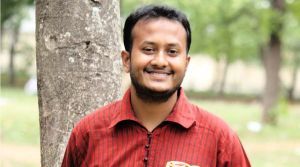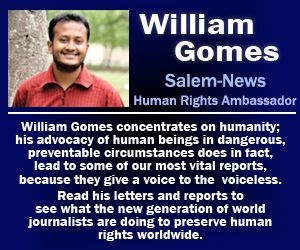Letter by William Gomes Salem-News.com

Human Rights Ambassador William Nicholas Gomes contacts officials in Nepal over police torture and illegal arrest.
Rt. Hon. Dr. Baburam Bhattarai |
(HONG KONG) - Policemen denying their identity and operating illegally; it is a problem thatranges from right here in Salem, Oregon, to as we learn, Kathmandu, Nepal, where a young man was recently tortured by police in civilian clothes.
 |
It's nothing like the song made famous by Bob Seger, we could only wish. Instead it is a place where thousands of Nepali-speaking families who have lived for several generations in Bhutan, exist in refugee camps.
Jit Bahadur Subba, 29, is one of the many people in the area living in the Bhutanese refugee camp, Beldangi II. He was picked up by police and tortured, after he had applied for resettlement to the USA. His ordeal began as he was going through the immigration process at the transit office of the International organization for Migrant (IOM) in Baluwatar, Kathmandu.
He was tortured and threatened by police who refused to identify themselves, which is one of the most basic requirements of any law enforcement officer, if for no other reason, than to simply demonstrate that they are indeed police. Tax-paid government law enforcement officers are not granted permission to operate as shadowy, illicit figures.
Besides, according to Nepal's Evidence Act, 1974, statements “extorted by torturing or threatening to placing the accused in a situation in which he was compelled to do so against his will” cannot be used against the accused in court proceedings.
| “ | May 14,2012 Rt. Hon. Dr. Baburam Bhattarai Prime Minister of Nepal Office of the Prime Minister and Council of Nepal Singh Durbar P.O. Box: 43312 Kathmandu Nepal Fax: +977 1 4211 086 Email: info@opmcm.gov.np, bhattaraibaburam@gmail.com Dear Prime Minister of Nepal, I am William Nicholas Gomes, Human Rights Ambassador for Salem News.com. I am writing to voice my deep concern regarding the torture faced by a Bhutanese refugee, Jit Bahadur Subba, at the hands of two policemen in the Central Investigation Bureau, Maharajganj, Kathmandu. According to the information I have received from the Asian Human Rights Commission (AHRC), 29-year-old Jit Bahadur Subba lives in the Bhutanese refugee camp, Beldangi II. He belongs to one of the thousands Nepali-speaking families who after having lived for several generations in Bhutan were expulsed from the country to refugee camps in Nepal twenty years ago. Mr. Subba had applied for resettlement to the USA and was kept in the transit office of the International organization for Migrant (IOM) in Baluwatar, Kathmandu for investigation of his document from 12th to 27th April 2012. I am informed that on 27 April 2012 at around 2.30 pm he was arrested from the IOM office by 4 to 5 police officers in civilian clothes. He was not given any reason for his arrest nor was any arrest warrant produced by the police. He was then brought to the Central Investigation Bureau (CIB), Maharajganj, Kathmandu. He was kept there for two days, without being provided with a detention letter or an arrest warrant. He was brought before a judicial authority on 29 April 2012, exceeding the 24-hour delay set up by the constitution for every person who is arrested to be produced before a judicial authority. This amounts to illegal detention and being kept incommunicado makes him more vulnerable to torture and ill-treatment. I am told that he was kept in the CIB for two days, reportedly without being provided with any food or water. His family was not informed of his arrest. On his first day there he was interrogated regarding his alleged involvement in the forging of a fake passport and of having purchased Nepali citizenship. I am further informed that he was tortured under interrogation by two policemen, wearing civilian clothes. He was slapped on the face a dozen times, the sole of his feet were beaten and the policemen beat him all over his body. Due to the pain he almost lost consciousness. The policemen then interrogated him on other persons’ involvement in the same charges and, as he could not provide information, the policemen put a packet of drugs in his pocket and threatened him to charge him under drug smuggling. As the policemen were wearing civilian clothes, he could not identify their ranks.On 29th April, he was sent to Metropolitan Police Range, Hanumandhoka, Kathmandu, and was provided with warrant papers. He was produced before Kathmandu District Court on the same day. The court remanded him into custody for five days a first time, and for six days a second time. According to the police his case is under investigation under charges of forgery of citizenship documents and passport. I am aware that at no point during his detention was Mr. Subba informed of his legal rights. His lawyer visited him twice: once on 3 May in the office of the District Attorney, Kathmandu, and the second time on 8 May at the MPR Hanumandhoka. In both cases the police refused to allow the lawyer to meet with his client without the police presence. This is in spite of the Interim Constitution of Nepal guaranteeing the right of every person who was arrested to consult a legal practitioner and that the consultation should remain confidential. I am further surprised to learn that the police was also present during the medical examination of the victim when they sent him to Bir hospital on 7 May. Due to the presence of the police, the victim did not dare mentioning the torture to the doctor and the doctor did not ask about it either. Therefore the presence of the police during the medical examination prevented the victim from getting proper treatment. I am concerned to hear that the victim’s health condition has deteriorated for lack of proper treatment and the poor conditions in Hanumandhoka detention center. His body is covered with scars of worms and insects and he suffers from sleeplessness. I am further concerned that the victim may face further torture in Hanumandhoka police station and am of the opinion that it is the government’s responsibility to guarantee his physical and psychological protection immediately. Further, according to the Evidence Act, 1974, statements “extorted by torturing or threatening to placing the accused in a situation in which he was compelled to do so against his will” cannot be used against the accused in court proceedings. I urge you to make sure that this principle is upheld in the further proceedings faced by Mr. Subba. Please be informed that the Salem News Human Rights Ambassador is writing a separate letter to the UN Special Rapporteur on torture and other cruel, inhuman or degrading treatment or punishment calling for his intervention into this matter. Further, I am of the opinion that an immediate investigation by a competent and independent authority should be launched into the allegations of police torture faced by Mr. Subba. I further call on you to ensure that all the legal rights of Mr Subba are guaranteed; including his right to have access to his lawyer without the presence of policemen. Yours sincerely, William Nicholas Gomes Human Rights Ambassador for Salem News.com www.williamgomes.org | ” |
______________________________

Salem-News.com Human Rights Ambassador William Nicholas Gomes is a Bangladeshi journalist, human rights activist and author was born on 25 December, 1985 in Dhaka.As an investigative journalist he wrote widely for leading European and Asian media outlets.
He is also active in advocating for free and independent media and journalists’ rights, and is part of the free media movement, Global Independent Media Center – an activist media network for the creation of radical, accurate, and passionate telling of the truth. He worked for Italian news agency Asianews.it from year 2009 to 2011, on that time he was accredited as a free lance journalist by the press information department of Bangladesh. During this time he has reported a notable numbers of reports for the news agency which were translated into Chinese and Italian and quoted by notable number of new outlets all over the world.He, ideologically, identifies himself deeply attached with anarchism. His political views are often characterized as “leftist” or “left-wing,” and he has described himself as an individualist anarchist.
No comments:
Post a Comment